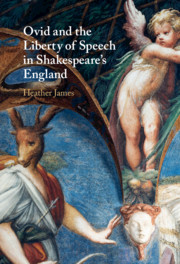Book contents
- Ovid and the Liberty of Speech in Shakespeare’s England
- Ovid and the Liberty of Speech in Shakespeare’s England
- Copyright page
- Contents
- Figures
- Acknowledgments
- Introduction Taking Liberties
- Chapter 1 Flower Power
- Chapter 2 Loving Ovid
- Chapter 3 Shakespeare’s Juliet
- Chapter 4 In Pursuit of Change
- Chapter 5 The Trial of Ovid
- Epilogue Ovid in the Hands of Women
- Bibliography
- Index
Chapter 2 - Loving Ovid
Marlowe and the Liberties of Erotic Elegy
Published online by Cambridge University Press: 18 June 2021
- Ovid and the Liberty of Speech in Shakespeare’s England
- Ovid and the Liberty of Speech in Shakespeare’s England
- Copyright page
- Contents
- Figures
- Acknowledgments
- Introduction Taking Liberties
- Chapter 1 Flower Power
- Chapter 2 Loving Ovid
- Chapter 3 Shakespeare’s Juliet
- Chapter 4 In Pursuit of Change
- Chapter 5 The Trial of Ovid
- Epilogue Ovid in the Hands of Women
- Bibliography
- Index
Summary
Christopher Marlowe was the boldest of the Elizabethan Ovidians and, moreover, the first Elizabethan to translate all of Ovid’s bold erotic elegies into English and, further, to infuse his own poetry and plays with what he saw as the combustible core of Ovid’s boldness in the erotic elegies, or Amores. This chapter establishes Marlowe’s iconoclasm and supposed exceptionalism as a model for his peers and colleagues to adopt and adapt. For Marlowe, Ovidian allusion involves a challenge to change, adapt, and innovate. This is the poetic model that Marlowe employed in his verse and plays such as Tamburlaine, Edward II, and Doctor Faustus and, moreover, the model he passed along to his colleagues and followers.
- Type
- Chapter
- Information
- Ovid and the Liberty of Speech in Shakespeare's England , pp. 55 - 100Publisher: Cambridge University PressPrint publication year: 2021

